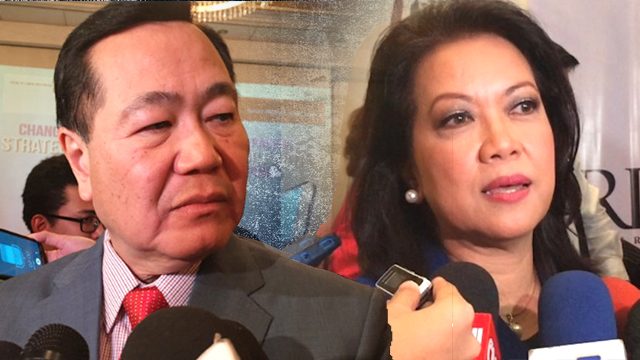SUMMARY
This is AI generated summarization, which may have errors. For context, always refer to the full article.

MANILA, Philippines – Chief Justice Maria Lourdes Sereno and Senior Associate Justice Antonio Carpio said in separate opinions on petitions against martial law in Mindanao that President Rodrigo Duterte must be watched closely as he exercises his power to implement Proclamation 216.
Sereno, who partially granted the petitions against Proclamation 216, said in her opinion that Duterte should not have been given the sole discretion to proclaim martial law over the entire Philippines, or in areas where he is convinced there is rebellion.
Sereno criticized the majority ruling of the Supreme Court (SC) which, she said, “effectively gave Duterte carte blanche” or the exclusive right to decide over the matter.
“Validating a Mindanao-wide coverage is indeed convenient for the Court but it is not right. If, to use the words of the ponencia, the most important objective of Article VII, Section 18 is to ‘curtail the extent of the power of the President,’ then this Court miserably failed,” Sereno said in her opinion which sought to limit the scope of martial law to Lanao del Sur, Maguindanao, and Sulu.
Watch his words
In his opinion, Carpio said Duterte’s words should not be taken lightly, especially when the Chief Executive had said that his martial law “will not be any different from what Marcos did.”
Noting that the late strongman Ferdinand Marcos “abolished Congress, shut down media, imprisoned leaders of political opposition, packed the SC with his law school classmates and loyalists and ruled by decree,” Carpio said the Court should make sure Duterte does not repeat history.
“It is apparent that President Duterte does not understand, or refuses to understand, this fundamental principle that forms part of the bedrock of our democracy under the 1987 Constitution, despite his having taking a solemn oath of office to preserve and defend the Constitution,” Carpio said in his separate opinion seeking to limit martial law to Marawi City.
Over 9 pages, Carpio enumerated the possible consequences of martial law which include wiretapping and government takeover of businesses, the news media, and even services such as telecommunications, power supply, and airlines.
He reminded that these are all powers given to the President if national security or public safety requires it.
Carpio said, however, that these powers cannot be exercised without a specific law enacted by the Congress, in a seeming nudge to the legislative department, which is dominated by Duterte allies.
“A declaration of martial law or suspension of the privilege of the writ has a built-in trigger mechanism for the applicability of other constitutional provisions that may lawfully restrict the enjoyment of constitutional rights, provided there are existing laws specifically authorizing such restrictions,” Carpio said.
Martial law use
Sereno said that based on the private briefing by Defense Secretary Delfin Lorenzana and Armed Forces chief General Eduardo Año, some of the violence in Mindanao “may have been committed by the Moro National Liberation Front (MNLF), Moro Islamic Liberation Front (MILF), or the New People’s Army (NPA).”
In fact, the military’s operational directive for the imposition of martial law in Mindanao targets communist rebels, drug syndicates, and other peace spoilers.
“Unless the President is saying that the publicly-announced peace negotiations being conducted with the MNLF, the MILF and the NPA/NDF are being completely abandoned, acts attributable to these 3 rebel groups cannot serve as the factual basis for Proclamation No. 216,” Sereno said. (READ: Duterte slams communists for NPA attacks despite promises)
The Chief Justice went further and said Duterte must not be allowed to broaden the use of martial law “to solve other social ills.” Sereno said the Constitution does not give Duterte “and his officials…unhampered discretion to wield his powers in any way and whichever direction he desires.”
“These standards ensure that Marcosian martial law does not happen again and the foundations of a just and humane society envisioned by the Constitution remain intact,” Sereno said.
Carpio echoed Sereno’s caution. “The Court cannot play with the fire of martial law which could turn into ashes the very Constitution that members of the Court are sworn to preserve and defend, a tragic event that that once befell the Court in 1972 and brought the Court to its lowest point in history,” he said in his opinion.
On Tuesday, July 4, the High Court voted 11-3-1 upholding the constitutionality of Duterte’s Proclamation 216. Aside from Carpio and Sereno, Associate Justice Benjamin Caguioa also partially granted the petitions against the presidential proclamation while Associate Justice Marvic Leonen was the lone dissenter. – Rappler.com
Add a comment
How does this make you feel?
There are no comments yet. Add your comment to start the conversation.